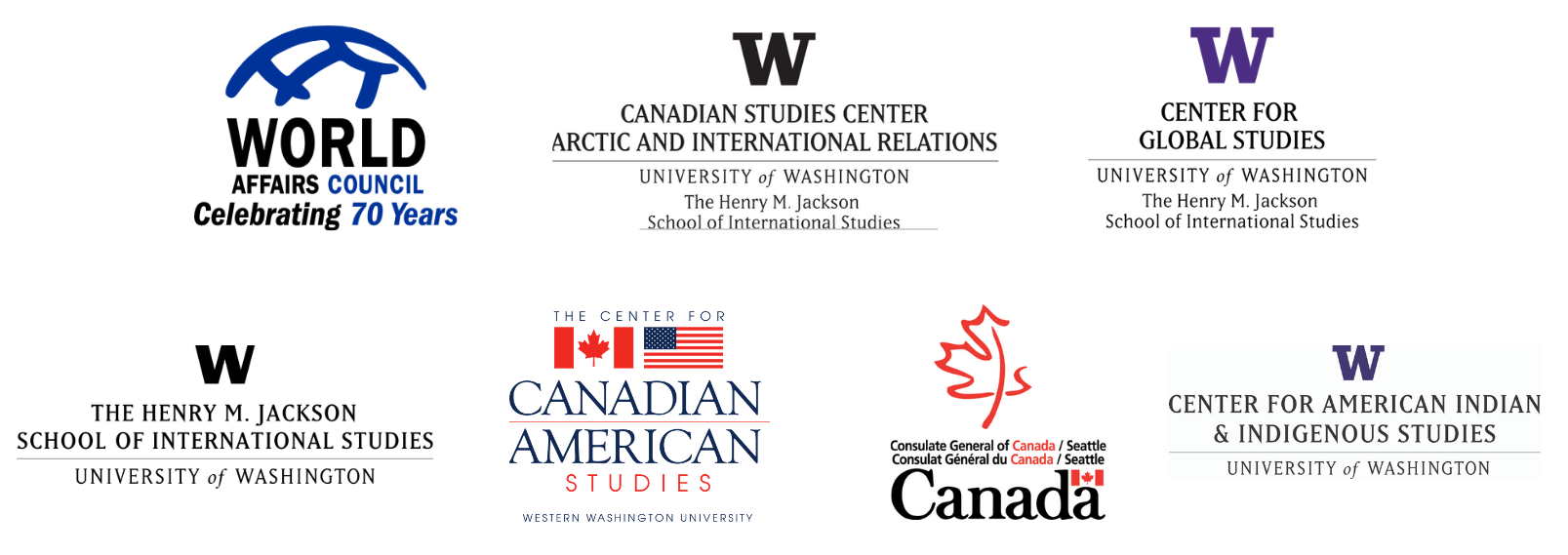Arctic Series 2021 | K-16 Educator Workshop Series
February 25th, 2021 4:00PM -6:00PM
The K-16 Educator Workshop Series includes five virtual sessions. The links for each respective session will be sent the day before the workshop date. Participants will receive a comprehensive Arctic Series 2021 Curriculum Resource Guide for each session and Washington State educators may apply for up to 11 clock hours upon completion of the series.
SERIES DESCRIPTION
The World Affairs Council - Seattle; the Canadian Studies Center and Center for Global Studies, Henry M. Jackson School of International Studies, University of Washington (UW); the Native American and Indigenous Studies Center, UW; the Consulate General of Canada, Seattle; and the Center for Canadian-American Studies, Western Washington University, are thrilled to present Arctic Series 2021. To kickstart the K-16 Educator Workshop Series, we hosted a public lecture focusing on The Climate Change Emergency and Gwitchin Leadership (if you missed this event, details can be found towards the end of this page).
The K-16 Educator Workshop Series (registration open now), will introduce educators to the Arctic today including the role of Arctic Indigenous peoples in international relations, their communities and languages. University of Washington’s network of scholars in Arctic and Indigenous studies will provide a historic context for the circumpolar world as well as address the role of ice in nature and culture and the tremendous impact of climate change in the region (a small registration fee is required, space is limited).
Interested in attending the accompanying K-16 Educator Workshop Series? Click the buttons to learn more about each of our upcoming sessions & register today!
4:00-5:00, While In Inuit Homelands - How Inuit are Leading Arctic Research and Governance, Victoria Buschman, doctoral candidate, School of Environmental and Forest Sciences, University of Washington.
5:00-6:00, Arctic Indigenous Peoples,Jason Young, Ph.D., Senior Research Scientist, Information School and Affiliated Faculty, Canadian Studies Center, Henry M. Jackson School of International Studies, University of Washington
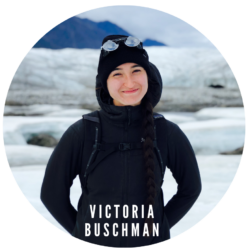 Victoria Qutuuq Buschman is an Iñupiaq (Inuit) wildlife and conservation biologist partially raised in Utqiaġvik, Alaska & now living in Nuuk, Greenland. She has lived & worked across the Arctic in an effort to promote how Indigenous Peoples fundamentally shape Arctic biodiversity conservation, from research, to management, to actualizing the dreams of new protected areas. Her research challenges the colonial legacy of conservation & instead promotes partnerships with Indigenous communities, knowledge, & governance to develop ethically-conscious, culturally-relevant, & fully knowledge-based conservation efforts in the Arctic.
Victoria Qutuuq Buschman is an Iñupiaq (Inuit) wildlife and conservation biologist partially raised in Utqiaġvik, Alaska & now living in Nuuk, Greenland. She has lived & worked across the Arctic in an effort to promote how Indigenous Peoples fundamentally shape Arctic biodiversity conservation, from research, to management, to actualizing the dreams of new protected areas. Her research challenges the colonial legacy of conservation & instead promotes partnerships with Indigenous communities, knowledge, & governance to develop ethically-conscious, culturally-relevant, & fully knowledge-based conservation efforts in the Arctic.
4:00-5:00, Ice as Alive!, Max Showalter, Ph.D., Interagency Ocean Policy Fellow at the NOAA Office of Exploration and Research
5:00-6:00, Climate Change Landscape Impacts in the North,Kevin Turner, Ph.D., Brock University, 2020-21 Fulbright Canada Chair in Arctic Studies, University of Washington
FEATURED SPEAKERS:
 Max Showalter works as the Knauss Ocean Policy Fellow engaging in both Ocean & Arctic science policy. He has a background in sea ice microbiology & life at the extremes, having earned a PhD in Oceanography & Astrobiology at the University of Washington (2020). In over 500 days at sea, including expeditions to both Antarctica & the North Pole, he has performed laboratory & computational work to understand how bacteria & their viruses support life in sea ice & hold clues to life in outer space. While at UW, he also studied Inuktitut through the Canadian Studies Center (supported, in part by the Center for Global Studies) to connect human & microbial elements of sea ice.
Max Showalter works as the Knauss Ocean Policy Fellow engaging in both Ocean & Arctic science policy. He has a background in sea ice microbiology & life at the extremes, having earned a PhD in Oceanography & Astrobiology at the University of Washington (2020). In over 500 days at sea, including expeditions to both Antarctica & the North Pole, he has performed laboratory & computational work to understand how bacteria & their viruses support life in sea ice & hold clues to life in outer space. While at UW, he also studied Inuktitut through the Canadian Studies Center (supported, in part by the Center for Global Studies) to connect human & microbial elements of sea ice.
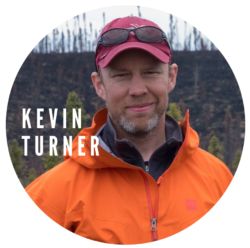 Dr. Kevin Turner, 2020-21 Fulbright Canada Chair in Arctic Studies, University of Washington, is an associate professor at Brock University where he is a co-founder of the Water & Environment Lab. Using techniques spanning multiple disciplines including hydrology, paleolimnology, remote sensing, & spatial analysis, his research team investigates relations among climate, land cover, ground conditions, disturbance & lakes and rivers. Fostering collaborations with the Vuntut Gwitchin First Nation, Parks Canada, & other partners has been essential for maintaining long-term projects of Kevin & his students.
Dr. Kevin Turner, 2020-21 Fulbright Canada Chair in Arctic Studies, University of Washington, is an associate professor at Brock University where he is a co-founder of the Water & Environment Lab. Using techniques spanning multiple disciplines including hydrology, paleolimnology, remote sensing, & spatial analysis, his research team investigates relations among climate, land cover, ground conditions, disturbance & lakes and rivers. Fostering collaborations with the Vuntut Gwitchin First Nation, Parks Canada, & other partners has been essential for maintaining long-term projects of Kevin & his students.
4:00-5:00, Indigenous Influence in Global Affairs, Liza Mack (Aleut), Executive Director, Aleut International Association.
5:00-6:00, Exploring the Structural Issues Impacting Inuit Children and Families in Nunavut, Canada, Patricia Johnston, Banting Postdoctoral Fellow, Canadian Studies Center, Henry M. Jackson School of International Studies, University of Washington
 Liza Mack serves as the Executive Director for Aleut International Association (AIA), which is one of the Permanent Participants of the Arctic Council. AIA represents the Aleut people that live in both Russia and the United States in the Arctic Council.
Liza Mack serves as the Executive Director for Aleut International Association (AIA), which is one of the Permanent Participants of the Arctic Council. AIA represents the Aleut people that live in both Russia and the United States in the Arctic Council.

4:00-5:00, Inuktitut, the Inuit Language, Alexina Kublu, Inuit Language Instructor, UW; Ellen Ahlness, doctoral candidate, Political Science & FLAS Fellow in Inuktitut, UW; Elena Bell, doctoral candidate, International Studies & FLAS Fellow in Inuktitut, UW; & Elizabeth Wessells, doctoral student, Anthropology & FLAS Fellow in Inuktitut, UW
5:00-6:00, Inukkitivut Ilukkusivut, Our People Our Culture, Jodie Lane, B.A., M.Ed., Director of Education, Education & Economic Development, Government of Nunatsiavut
 Alexina Kublu is an instructor of Inuktitut at UW teaching out of Iqaluit, Nunavut. She received her Bachelor of Education Degree from the Nunavut Teacher Education Program, with additional training out of Chesterfield Inlet & Fort Smith & has taught in schools in Igloolik, Arctic Bay, Cape Dorset & Arviat, as well as Nunavut Arctic College.
Alexina Kublu is an instructor of Inuktitut at UW teaching out of Iqaluit, Nunavut. She received her Bachelor of Education Degree from the Nunavut Teacher Education Program, with additional training out of Chesterfield Inlet & Fort Smith & has taught in schools in Igloolik, Arctic Bay, Cape Dorset & Arviat, as well as Nunavut Arctic College.PUBLIC LECTURE | The Climate Change Emergency and Gwitchin Leadership
Tuesday, February 9th, 2021 | 4:00 - 5:30PM PST
The Arctic landscape is changing dramatically as a result of rising temperatures. In early May 2019 the UK was the first nation-state to declare a climate change emergency; later that month, the Gwitchin First Nation, Yukon was the first Indigenous community to draft a similar declaration--Yeendoo Diinehdoo Ji’heezrit Nits’oo Ts’o’ Nan He’aa (or After Our Time, How Will the World Be?). Chief Dana Tizya-Tramm (pictured below) of the Vuntut Gwitchin Government, the youngest person to hold the title, declared a climate change state of emergency. The declaration calls on all levels of government to respect the traditional knowledge of Indigenous people, science and “utilize all available powers, resources and abilities to coordinate and mobilize efforts” to prevent temperatures from rising further.
To the climate change emergency are added the issues now facing the Porcupine Caribou Herd particularly with the recent auctioning off of portion of the National Wildlife Refuge to oil developers. In addition to the impact this development will have on global warming, the Vuntut Gwitchin community of Old Crow is located on the migratory path of the Porcupine Caribou. As a result, the caribou have played a key role in the economy and culture for thousands of years. However, for Tizya-Tramm, the hopeful part about these challenges is that they “call on the foundation of our great country of Canada’s intention for Indigenous and non-Indigenous peoples to become one nation together for all of our grandchildren.”
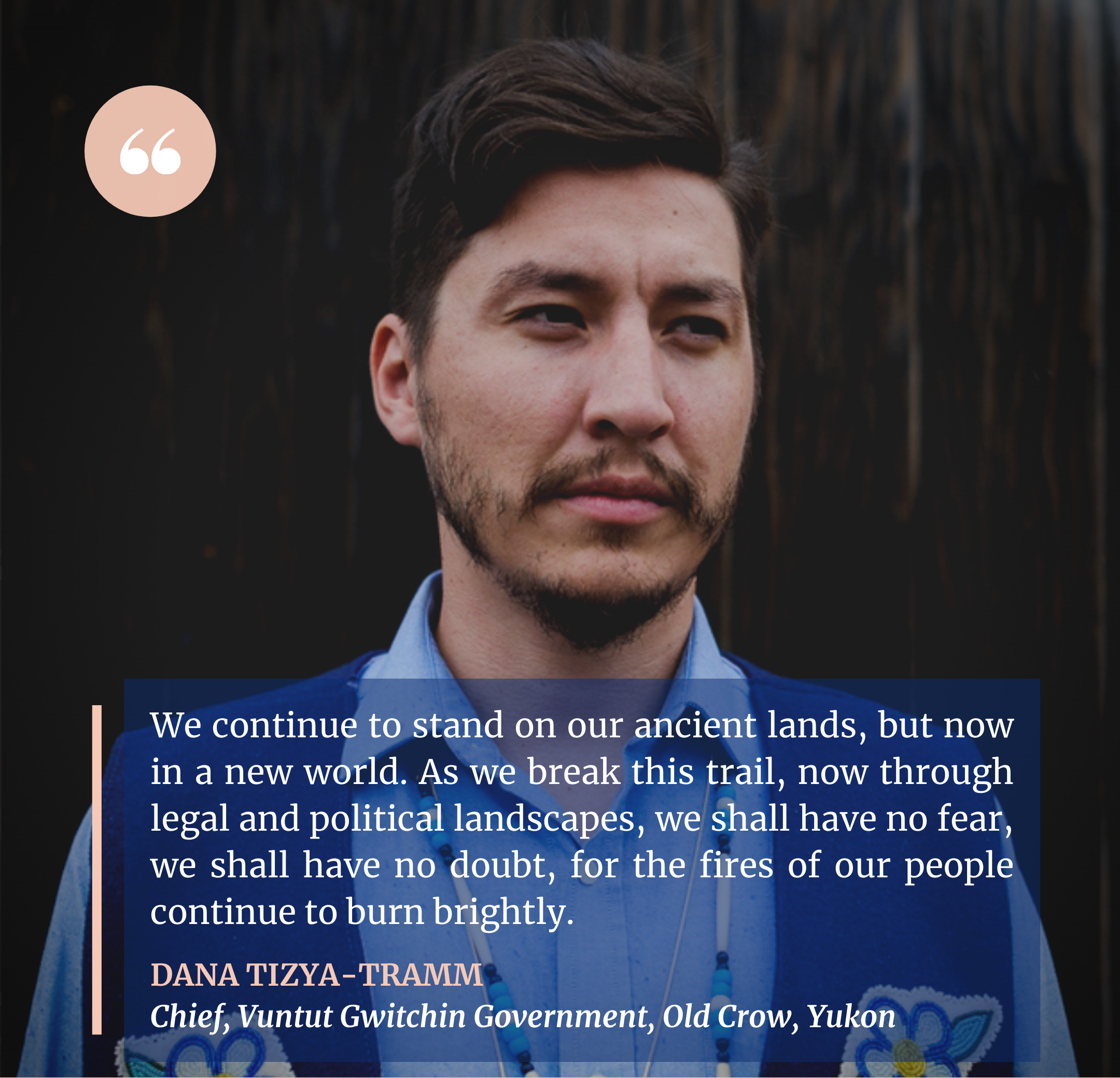 Chief Dana Tizya-Tramm was elected Chief of the Vuntut Gwitchin First Nation in November of 2018 and took office January of 2019. According to a recent article in UpHere today, at 32, Tizya-Tramm is a leading voice on how climate change is impacting the North. He travels the world hoping to inspire other Indigenous land and water protectors. “He is charismatic, and he is convincing. He is, as one Vuntut Gwitchin citizen puts it, ‘exactly what we need right now.’”
Chief Dana Tizya-Tramm was elected Chief of the Vuntut Gwitchin First Nation in November of 2018 and took office January of 2019. According to a recent article in UpHere today, at 32, Tizya-Tramm is a leading voice on how climate change is impacting the North. He travels the world hoping to inspire other Indigenous land and water protectors. “He is charismatic, and he is convincing. He is, as one Vuntut Gwitchin citizen puts it, ‘exactly what we need right now.’”
In this “fireside chat,” Chief Dana Tizya-Tramm and Dr. Kevin Turner, will discuss emerging issues and priorities identified by the Vuntut Gwitchin First Nation in the face of global challenges. Diverse topics will include efforts to conserve the Porcupine Caribou Herd, adjustments during a pandemic, and pathways for unifying traditional insight of changing climate and landscapes with ongoing science-based monitoring approaches.
FEATURED ARTIST:
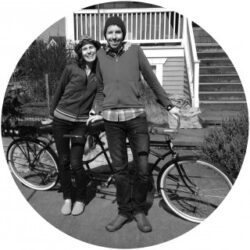 Maria Coryell-Martin works in the tradition of traveling artists as naturalists and educators. Since 2005, she has focused on painting polar and glaciated regions where she has often collaborated with scientific teams. In the field, she sketches with ink and watercolor, and collects multimedia recordings to build her palette of place, a record of experience, climate, and color. She develops this work into studio paintings for exhibits as well as presentations and workshops for audiences of all ages to cultivate observation, scientific inquiry, and environmental awareness.
Maria Coryell-Martin works in the tradition of traveling artists as naturalists and educators. Since 2005, she has focused on painting polar and glaciated regions where she has often collaborated with scientific teams. In the field, she sketches with ink and watercolor, and collects multimedia recordings to build her palette of place, a record of experience, climate, and color. She develops this work into studio paintings for exhibits as well as presentations and workshops for audiences of all ages to cultivate observation, scientific inquiry, and environmental awareness.
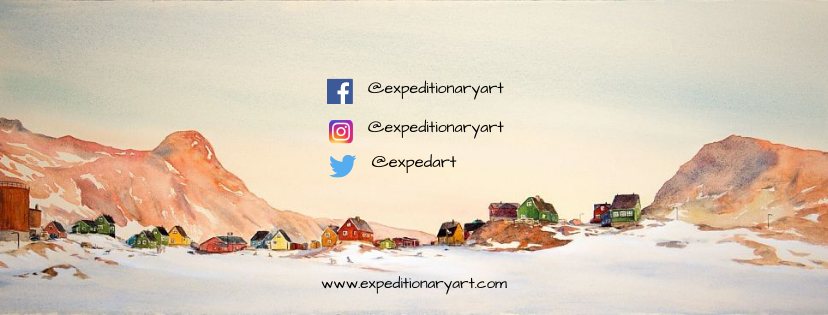
Sponsors: This public lecture and five-part series were made possible with support from the World Affairs Council - Seattle; the Pacific Northwest National Resource Center on Canada (Canadian Studies Center/Arctic and International Relations, Henry M. Jackson School of International Studies, University of Washington and the Center for Canadian-American Studies, Western Washington University); the Center for Global Studies, Henry M. Jackson School of International Studies, University of Washington, the Henry M. Jackson School of International Studies, University of Washington; the Native American and Indigenous Studies Center, University of Washington; and the Consulate General of Canada in Seattle.
This event is made possible, in part, by Title VI grant funding administered by the International and Foreign Language Education office in the Office of Postsecondary Education, U.S. Department of Education.
Please reach out to Global Classroom Director, Ryan Hauck, at rhauck@world-affairs.org if you have questions or need additional information about the series.
